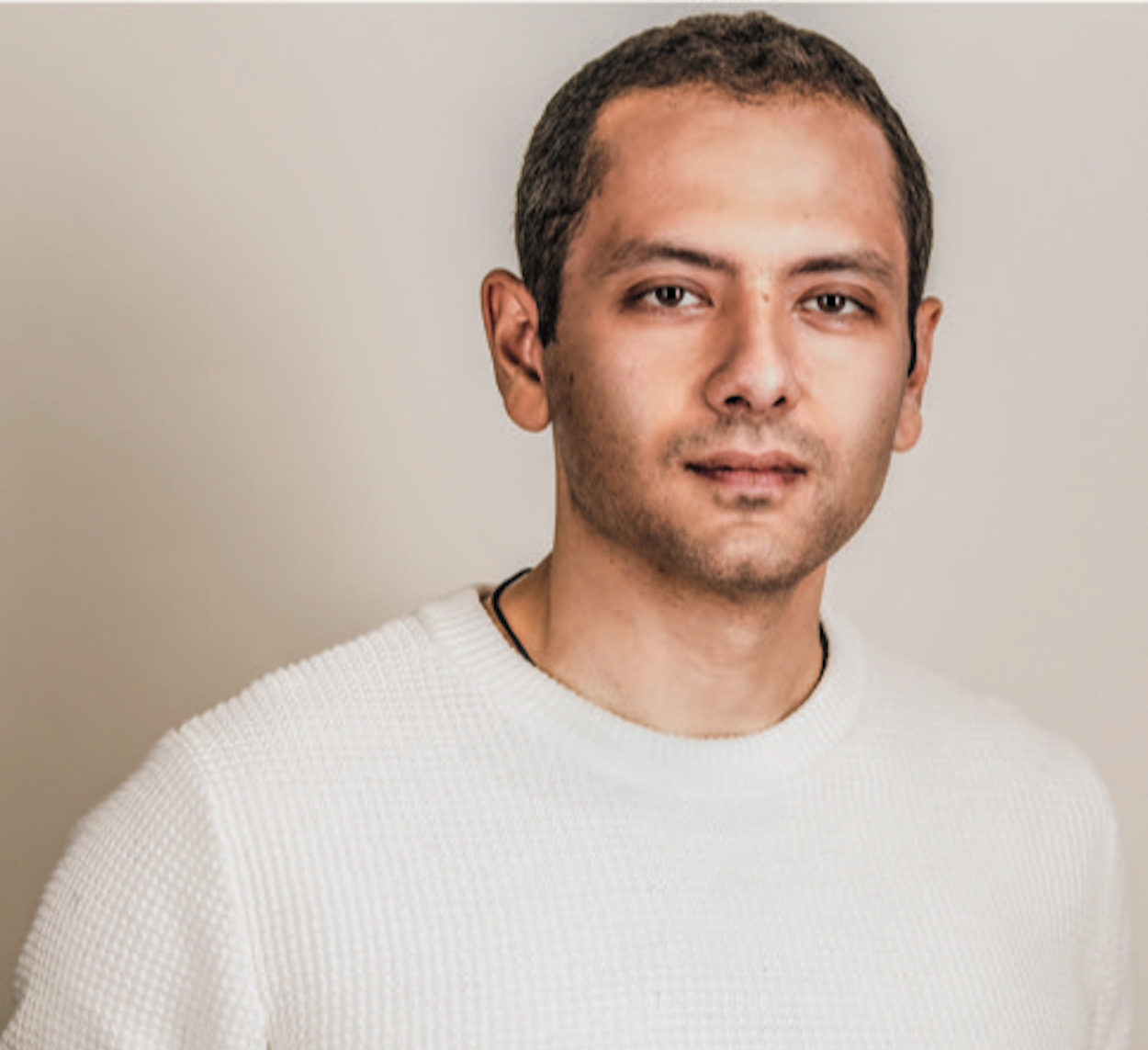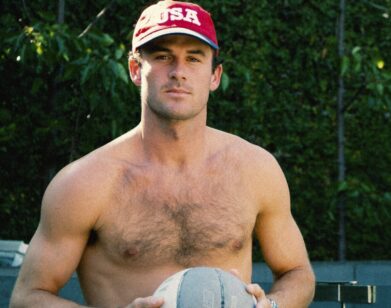books!
Omar El Akkad on “the Privilege of Instantaneous Forgetting”
Two literary quotations serve as epigraphs of Omar El Akkad’s second novel What Strange Paradise. One is from Ambrose Bierce’s 1890 hallucinogenic short story “An Occurrence at Owl Creek Bridge,” the other from J.M. Barrie’s classic fairytale Peter Pan. In more ways than one, these texts serve as unexpected guides to El Akkad’s luminous, heartbreaking novel about a young Syrian refugee named Amir who washes up on a small unnamed Greek island, the only survivor of a boat of hopeful, lost souls fleeing their respective home countries in hopes of asylum in Europe. El Akkad’s first novel, 2017’s American War, jumped into the dystopian future to depict a second Civil War breaking out in a ransacked, climate-wrecked United States roiling with ideology and violence.
The timeline of What Strange Paradise is much closer to the present day, creating a two-pronged narrative, with chapters that alternate between “Before” and “After”: before the island when Amir inadvertently boards a human smuggling ship in Alexandria and ends up weathering a terrifying voyage through on the sea; and after Amir leaves the beach, linking up with a sympathetic Greek teenager named Vänna, who helps him escape the clutches of a war-hardened army colonel. El Akkad may have written a bleak fantasy story, but it’s deeply rooted in the visceral, real-life horrors of the ongoing refugee crisis and it’s hard to think of more capable and talented hands to tackle the brutality and humanity of Amir’s plight. “She had seen so many over the last year,” El Akkad writes about one character’s reaction to the young victims that end up isolated on Greek shores, “alone, malnourished; orphaned by war or by sea; made into the undercurrents of themselves, broken in ways that rendered them unable to continue as children and yet a part of them left childlike forever.” El Akkad, also a journalist, lives in Portland with his wife and two children, and we spoke by Zoom about Egypt, fables, and fiction that doesn’t forget.
———
CHRISTOPHER BOLLEN: Before we launch into your novel, I wanted to ask you about your relationship with Egypt. You were born in Cairo. And I know you reported on the Arab Spring. Do you still go back from time to time?
OMAR EL AKKAD: I lived the first five years of my life in Cairo. All my extended family is Egyptian. But, in the mid ’80s, my father couldn’t find work and the political situation was really miserable in Egypt, so he moved to Qatar, and we moved with them. I was there for the next 11 years, although we did go back and forth to Egypt quite a bit, and then we immigrated to Canada. I haven’t been back to Egypt since 2012, when I was there on assignment. It was when Israel was bombing Gaza, so my paper sent me down to try to cross through the border with Egypt. The day I landed was a day of ceasefire, so we ended up missing that story. But then there were the next wave of protests, so i was there early for that story.
BOLLEN: Does Egypt still feel like a homeland to you?
EL AKKAD: It’s in my blood. My father loved Egypt, He marinated in that place. He knew every poet, every politician, he was passionate about it, so that was my central connection with the place. If I started speaking Arabic to you right now every Arab speaker in the world would instantly know I’m Egyptian. The Egyptian accent is very distinct, like the accent from South Boston. You’d know it from a million miles away. But also my Arabic is very weak because I’ve been studying in English since I was five. But whenever I’m in doubt about why I have a certain trait, I can always trace it back to Egypt.
BOLLEN: Do you feel let down by the outcome of the Arab Spring?
EL AKKAD: It broke my heart. I think it marks the last time I’m willing to let myself believe when it comes to my homeland and capacity for change. And I think that’s a very, profoundly cynical view on my part, but that was a real heartbreak. I’m horrified by the number of people who are now clearly willing to put up with any amount of bloodshed, any amount of repression, so long as things keep quiet. That was the fundamental disconnect right after the Arab Spring, you had all these generations who’d grown up in a society that was very stratified. Everybody knew their place, nobody talked out of turn, and suddenly there was this element of chaos, where the guy parking your car suddenly wasn’t calling you sir anymore. People could not deal with it. I think implicitly a huge portion of Egyptian society said, we will look away from any amount of repression or secret prisons, so long as you return back to that system we were comfortable with.
BOLLEN: The ill-fated ship of refugees crossing the sea into Greece in your novel embarks from Alexandria. That was a bit of a surprise to me because I don’t usually think of refugees leaving from Egypt.
EL AKKAD: There are certainly people who leave from Egypt, but you’re absolutely right, at least from my research, it’s not the leading port of exit by any stretch. There are a number of reasons why I chose Egypt, one being that it’s the territory I’m familiar with. Another being a conversation I had with an old high-school friend the last time I was there in 2012. He was complaining about rent prices—the rents were going through the roof. And I asked, “how much does an apartment in your building cost?” He said, “well do you mean the Egyptians’ price or the Syrians’ price?” A lot of people were fleeing there and they have no choice, so the landlords charge three times the rent. So I wanted to put that in my novel. You hear Arab leaders talk all the time about our Palestinian brothers and sisters, or our Syrian brothers and sisters. But in reality it’s all bullshit. On the ground, anyone who can be exploited is going to be exploited. Then the third reason is really insider baseball and self-indulgent on my part. Structurally, the book is very Biblical. You have a sort of Old Testament/New Testament quality. So I wanted an exodus from Egypt to match up with the miraculous rebirth. Again, very self-indulgent.
BOLLEN: The book has alternating chapters—“Before” and “After” on Amir’s journey. And even though the reader knows how the “Before” section ends, you still managed to build so much suspense. I’m wondering if you wrote one part and then the other and then shuffled them together, or kept switching back and forth as you went.
EL AKKAD: Much like American War, my first novel, this one went through major structural changes. There was a version of this book that had monologues by everyone in the boat interspersed between the chapters. It also had an entirely different ending. Then I came to the conclusion that I wanted to repurpose fables. I wanted a fantasy. I wanted to deliberately step away from the reality sandwiched between what I think are the only two honest paragraphs in this novel, which are the opening and closing paragraphs. Anyone who’s read An Occurrence at Owl Creek Bridge knows exactly how this book is structured. Anyone who’s read Peter Pan will catch the bizarre references in the book. After a while, I started finding more organic breaks in the narrative to make it work.
BOLLEN: Why did you pick Peter Pan as one of your models?
EL AKKAD: I wanted to take a comforting fairytale that Westerners have been telling their kids for 100 years and invert it. The origins of that particular story are far removed from the popular interpretation of Peter Pan today. When we talk about Peter Pan Syndrome we’re talking about a man who refuses to stop acting like a child. But J.M. Barrie’s brother died at 13 in an ice-skating accident, and that was a large prompt for him later in life to write to Peter Pan—so the origins are really about a child who never gets to be a man. That was one of the reasons that I wanted to use it, but also so much of the book for me is this collision of dueling fantasies: The fantasy that a lot of people have in the part of the world where I grew up where the West is this nirvana and cure for all ills; then the dueling fantasy, on the other side, where all those people over there are barbarians at the gate and we need to stop them at any cost, even if the cost is our own conscience. So I wanted that collision of fantasies and that particular story, for me, worked.
BOLLEN: Do you read your own kids Peter Pan?
EL AKKAD: My early reading was all very Arab, so I grew up on 1001 Nights and those fables. Then when you go back and read them as adults, you see the darkness in them that you missed when you were a kid. There’s a lot of darkness to Western fairy tales and fables too. Actually, I was just asked to write the introduction to a new translation of 1001 Nights that’s coming out this fall. And when I was rereading it, I realized when I was a kid and my uncle told me these stories, he was just freestyling, making things up, adding his own twist to the fables.
BOLLEN: Fables let you do that. You can spin the basic elements all sorts of ways. The “After” chapters of your novel takes place on an unnamed Greek Island. I kept trying to guess which island it was. Did you base it on a specific island in the Aegean?
EL AKKAD: Hold on. [El Akkad retrieves large fold-out map with post-its affixed to it]. This is Crete. This is the original map from a million years ago.
BOLLEN: What are the post-its for?
EL AKKAD: Charting the movement of the kids along the island. There’s a couple of very, very obtuse clues in the book. At one point they reference the cave in the center of the island where God was born—the Zeus legend in Crete. But at a point I made the very deliberate decision to have all the fauna and flora and geography be invented so none of the plants or birds belong to Crete. I wanted it to be a fantasy place. It’s a fantasy place superimposed on the eastern shore of Crete.
BOLLEN: On your fantasy Greek island, Amir runs into a sympathetic 15-year-old girl named Vänna.
EL AKKAD: She’s my inverted Wendy. She’s a person who, in my mind, is trying to figure out what goodness and kindness mean from a place of privilege. I think on some level she understands that her ability to offer a helping hand means that she’s already positioned above this person. What does that actually mean from the get-go to be born into a position above another human being? That fascinates me the most about her. She needs to be the good person who gets this child across the mainland. To me she’s having a complicated conversation about what it means to be privileged and what it means to be able to offer help in the first place.
BOLLEN: You have been a journalist as well as a novelist. Did that journalistic eye come into play when writing about the refugee crisis? Does that offer more authority to write about a very real political crisis than the lay novelist writing from very far from those shores?
EL AKKAD: I don’t know if I had any authority to write about it. I struggle with that question quite a bit. The nature of what I write is such that it overlaps almost entirely with what makes me angry. I don’t set out to write political books. I think the political intrudes on my writing. I didn’t choose to sound like I do or have this accent—if we were on the phone and I said I was John Smith, you’d probably believe me. I come from a generation of people whose countries were colonized and who were brought up believing that English is the winner’s language. So from from a very early age, we’re going to put our son in an English Speaking school, because that’s how you win. That’s what I mean when I talk about the political being sort of imposed on the work. That said, when I write these books, even in an abstract way, I am still a tourist in someone else’s misery. And I’ve never been able to reconcile my conscience when I write these books. I feel I need to say the things that are in these books, but that doesn’t take away from that feeling of not being sure if you have the right to do any of this. That’s still an open question in my mind.
BOLLEN: What Strange Paradise and your first novel, American War, are filled with something extremely rare in contemporary literary fiction—action. In this novel, there is so much physical movement. People are fleeing. People are being chased. There’s a constant forward thrust of being on the run. I don’t think most contemporary writers excel at plot and action, but you have a skill for it.
EL AKKAD: My only skill as a writer is stubbornness. So much of the story happens visually in my head. The first image that showed up in my head before I knew anything about this book was an image of a child coming out of the forest and locking eyes with another child. But you’re right. There’s so much movement to these books. It tricks producers into thinking that they should buy the film rights and they actually read the rest of the book and realize there’s no way they can make a movie out of the stone-cold bummer. Strangely, my favorite books have none of that. They completely set aside plot and narrative movement and that kind of action element for something else entirely, often something very surrealistic or postmodern. What I write is very different from what I read. I tend to write against my natural tendency.
BOLLEN: Maybe none of us has the authority to write fiction about the refugee crisis. But I do wonder, as we read more and more news stories of refugees fleeing Afghanistan and taking these same routes across the Aegean to get to Europe, if you see any possible solution. What can be done to help these asylum seekers and not turn it into a war between east and west?
AKKAD: There’s a poet named Marwa Helal who lives in New York. She has this great line in one of her poems, “They will say show don’t tell but that assumes most people can see.” I think about that a lot. I write against the privilege of instantaneous forgetting. I write against the privilege of looking away without consequence and all my books are in some way related to that idea of asking the reader to simply not look away.







